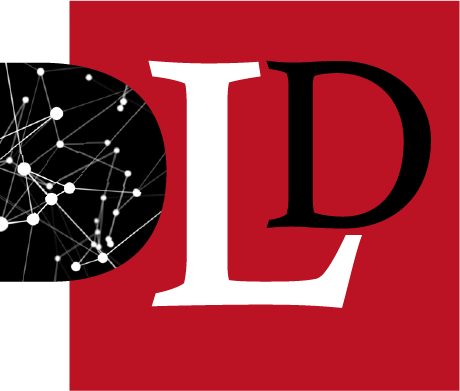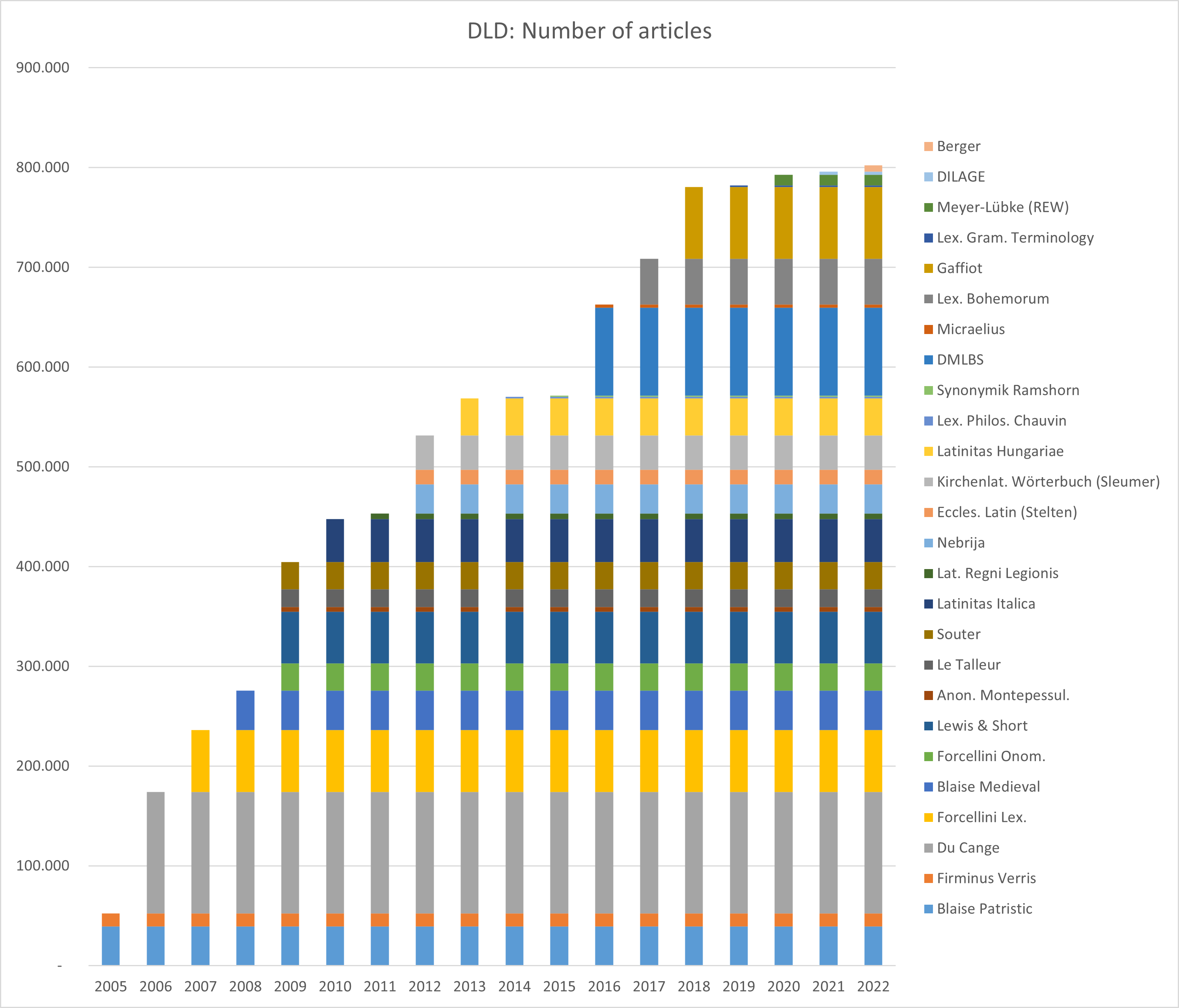
Introduction
The Database of Latin Dictionaries (DLD) is an unparalleled resource for research on the Latin language throughout the ages. Because of its broad spectrum of dictionaries, the DLD offers an immediate overview of Latin vocabulary that no isolated dictionary can give.
In order to cover all possible perspectives on Latin vocabulary, the DLD includes several types of dictionaries: ones that purely define and/or translate, next to thematic dictionaries and dictionaries that themselves date back to the medieval and early modern periods. As such, the DLD is a major tool both for students learning Latin and for experienced scholars of the language.
The interface allows for advanced search possibilities where all kinds of words or expressions, Latin and non-Latin, can be the object of queries.
Starting in 2005 with only two dictionaries, the DLD has now grown into a large collection of 27 dictionaries. Every year at least one dictionary is added and various improvements are made to the existing ones. These improvements may consist in corrections to the text of the dictionaries, expanded search possibilities, or the addition of newly published addenda. The DLD continually strives to provide its users with the best and most up-to-date information.
The present version of the DLD contains more than 800,000 dictionary articles.

Aims & Scope
The aim of the DLD is to produce for scholars and students an online database comprising a large number of different Latin dictionaries and lexica, so offering tools for:
- understanding Latin texts of various genres, periods, countries or regions;
- analyzing Latin vocabulary at different levels and with different focuses and purposes;
- selecting appropriate terms to conduct studies in the Latin textual databases;
- comparing the dictionaries with one another.
.
Along with the dictionaries, the DLD also offers a complete list of attested word forms and their corresponding lemmas. These lists are based on years of thorough research and text analysis done by the Centre ‘Traditio Litterarum Occidentalium’ for the Library of Latin Texts. The DLD contains more than 350,000 Latin word forms, 200,000 non-Latin words forms, and 95,000 lemmas.
One major feature of the DLD is the links that have been built with the full-text Latin databases (the Library of Latin Texts, the Monumenta Germaniae Historica, the Archive of Celtic-Latin Literature and the Aristoteles Latinus Database). These links enable the user who has conducted a search on a word in a dictionary within the DLD to export this word automatically to its sister-database and thereby identify actual occurrences of the particular word in Latin Literature.
Languages
While being in essence a database of Latin dictionaries, the DLD is also multilingual in that it contains translations, explanations and examples in various languages, which evidently add to its richness.
Up until now, the database comprises, as the main modern languages used in translation/explanation, English, French, German, Hungarian, Czech, and Spanish, and to a lesser extent also Italian, ancient Greek, Hebrew, Anglo-Saxon, Anglo-Norman, Old English, Middle French, and others.
Recent Updates
As of May 2023, the DLD’s new interface has been launched. This change of interface not only allows for more advanced search options (including, for instance, the possibility to look for phrases rather than just single headwords), but it also includes a first version of the Brepolis Latin lemmas, prepared by the Centre ‘Traditio Litterarum Occidentalium’ in order to strengthen the link between dictionaries and attestations in the full-text databases. (Video)
The 2023 update of the DLD includes the Dictionnaire Aalma, edited by Brian Merrilees †, William Edwards, and Anne Grondeux (Turnhout, 2019) and an update of the Dictionary of Medieval Latin from British Sources, based on the consolidated edition (Oxford, 2018).
Coverage
Defining and translating dictionaries
‘Defining’ dictionaries are those providing semantic and in some cases etymological explanations of Latin words, in Latin; cases in point are Forcellini’s Lexicon and Onomasticon and the Glossarium of Du Cange. ‘Translating’ dictionaries, on the other hand, are those providing translations and explanations of Latin words in modern languages, notably the Latin Dictionary of Lewis & Short, Souter’s Glossary of Later Latin, the two dictionaries by A. Blaise, and M. Pérez’ Lexicon on Medieval Latin from the Kingdom of León.
Download here the list of Defining and translating dictionaries (PDF, 6 pages)
Thematic dictionaries
This category includes dictionaries dealing with Ecclesiastical, Philosophical, Grammatical, Linguistic, Medical and Legal Latin.
Download here the list of Thematic dictionaries (PDF, 3 pages)
Medieval & Early Modern dictionaries
This category includes works that have been composed during the Middle Ages or the Early Modern period.
Download here the list of Medieval & Early Modern dictionaries (PDF, 1 page)
Scientific responsibility
The Database of Latin Dictionaries is produced by the Centre ‘Traditio Litterarum Occidentalium’ (CTLO) under the direction of Pr. Paul Tombeur and Pr. Toon Van Hal. The CTLO continues and develops the former activities in the field of Latin studies carried out by the Cetedoc. The Cetedoc was founded by the Université catholique de Louvain at Louvain-la-Neuve and has been developed jointly with the university.
 Leaflet
Leaflet
English version (PDF)
 Flyer
Flyer
English version (PDF)
 Slides
Slides
Getting Used to the DLD’s New Interface (PowerPoint)
 Videos
Videos
Webinar in English “Enhancing your lexicographical research with the new DLD and ALD interfaces” (21/04/2023):
 Clusters & Related Databases
Clusters & Related Databases
Clusters
The Database of Latin Dictionaries is included in the cluster BREPOLiS Latin Complete, together with the full-text databases Library of Latin Texts, Monumenta Germaniae Historica, Archive of Celtic-Latin Literature, Aristoteles Latinus Database, and the Cross Database Search Tool.
The DLD is also included in the cluster Library of Latin Texts Complete Plus, together with the Library of Latin Texts.
Linked Databases
‘Live links’ to the full-text databases Library of Latin Texts, Aristoteles Latinus Database, Monumenta Germaniae Historica, and Archive of Celtic-Latin Literature.
